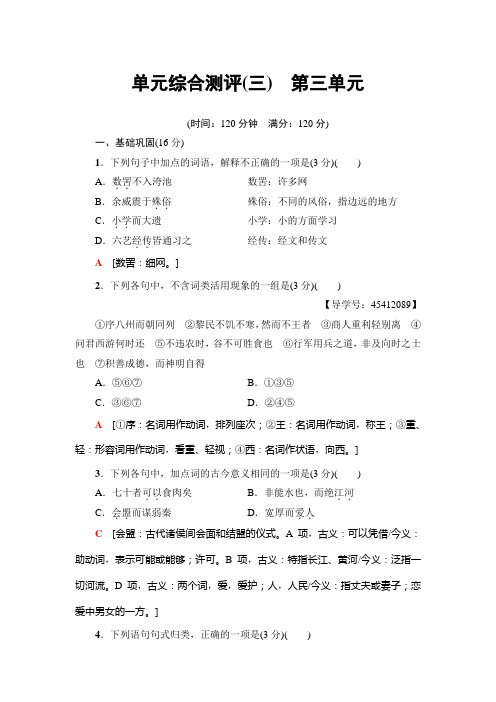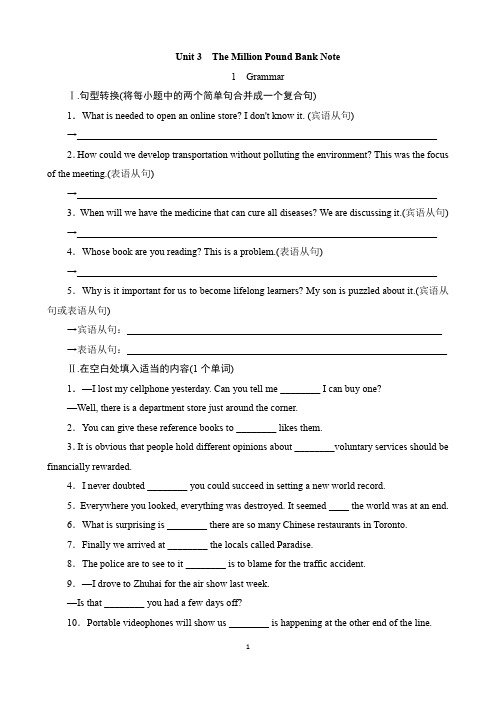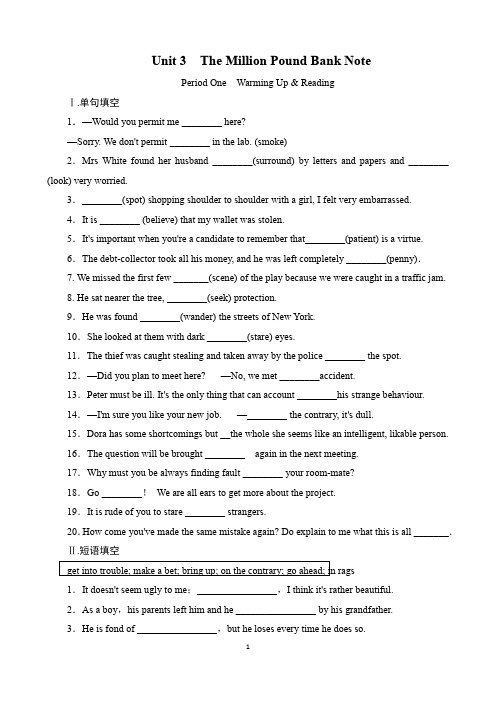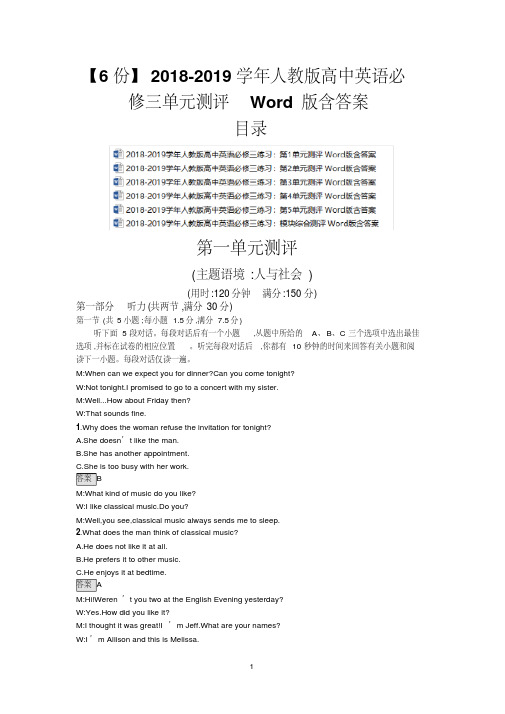人教版新课标2018-2019学年 必修三 第三单元课 单元综合测评 含答案详解
- 格式:docx
- 大小:35.25 KB
- 文档页数:14

单元综合测评(三)第三单元(时间:120分钟满分:120分)一、基础巩固(16分)1.下列句子中加点的词语,解释不正确的一项是(3分)()A.数罟..不入洿池数罟:许多网B.余威震于殊俗..殊俗:不同的风俗,指边远的地方C.小学..而大遗小学:小的方面学习D.六艺经传..皆通习之经传:经文和传文A[数罟:细网。
]2.下列各句中,不含词类活用现象的一组是(3分)()【导学号:45412089】①序八州而朝同列②黎民不饥不寒,然而不王者③商人重利轻别离④问君西游何时还⑤不违农时,谷不可胜食也⑥行军用兵之道,非及向时之士也⑦积善成德,而神明自得A.⑤⑥⑦B.①③⑤C.③⑥⑦D.②④⑤A[①序:名词用作动词,排列座次;②王:名词用作动词,称王;③重、轻:形容词用作动词,看重、轻视;④西:名词作状语,向西。
] 3.下列各句中,加点词的古今意义相同的一项是(3分)()A.七十者可以....食肉矣B.非能水也,而绝江河C.会盟....而谋弱秦D.宽厚而爱人C[会盟:古代诸侯间会面和结盟的仪式。
A项,古义:可以凭借/今义:助动词,表示可能或能够;许可。
B项,古义:特指长江、黄河/今义:泛指一切河流。
D项,古义:两个词,爱,爱护;人,人民/今义:指丈夫或妻子;恋爱中男女的一方。
]4.下列语句句式归类,正确的一项是(3分)()【导学号:45412090】①然而不王者,未之有也②蚓无爪牙之利,筋骨之强③身死人手,为天下笑者,何也④始皇既没,余威震于殊俗⑤句读之不知,惑之不解⑥六艺经传皆通习之,不拘于时⑦颁白者不负戴于道路矣⑧道之所存,师之所存也A.①⑤⑧/②/③⑥/④⑦B.①⑤/②⑧/③⑥/④⑦C.①⑤/②/③⑥/④⑦/⑧D.①⑤⑧/②/③/④⑥⑦C[①⑤为宾语前置句;②为定语后置句;③⑥为被动句;④⑦为状语后置句;⑧为判断句。
]5.补写出下列句子中的空缺部分。
(4分)【导学号:45412091】(1)《荀子·劝学》中强调人要广泛学习而且经常反省自己才会智慧明达的名句:“________________,________________。

Unit 3The Million Pound Bank Note1GrammarⅠ.句型转换(将每小题中的两个简单句合并成一个复合句)1.What is needed to open an online store? I don't know it. (宾语从句)→________________________________________________________________________ 2.How could we develop transportation without polluting the environment? This was the focus of the meeting.(表语从句)→________________________________________________________________________ 3.When will we have the medicine that can cure all diseases? We are discussing it.(宾语从句) →________________________________________________________________________ 4.Whose book are you reading? This is a problem.(表语从句)→________________________________________________________________________ 5.Why is it important for us to become lifelong learners? My son is puzzled about it.(宾语从句或表语从句)→宾语从句:_______________________________________________________________ →表语从句:________________________________________________________________ Ⅱ.在空白处填入适当的内容(1个单词)1.—I lost my cellphone yesterday. Can you tell me ________ I can buy one?—Well, there is a department store just around the corner.2.You can give these reference books to ________ likes them.3.It is obvious that people hold different opinions about ________voluntary services should be financially rewarded.4.I never doubted ________ you could succeed in setting a new world record.5.Everywhere you looked, everything was destroyed. It seemed ____ the world was at an end.6.What is surprising is ________ there are so many Chinese restaurants in Toronto.7.Finally we arrived at ________ the locals called Paradise.8.The police are to see to it ________ is to blame for the traffic accident.9.—I drove to Zhuhai for the air show last week.—Is that ________ you had a few days off?10.Portable videophones will show us ________ is happening at the other end of the line.Ⅲ.句型训练1.The teacher suggested ________________________________________.(that)老师建议我们为即将到来的期末考试做准备。

Unit 3The Million Pound Bank NotePeriod One Warming Up & ReadingⅠ.单句填空1.—Would you permit me ________ here?—Sorry. We don't permit ________ in the lab. (smoke)2.Mrs White found her husband ________(surround) by letters and papers and ________ (look) very worried.3.________(spot) shopping shoulder to shoulder with a girl, I felt very embarrassed.4.It is ________ (believe) that my wallet was stolen.5.It's important when you're a candidate to remember that________(patient) is a virtue.6.The debt-collector took all his money, and he was left completely ________(penny).7. We missed the first few _______(scene) of the play because we were caught in a traffic jam.8. He sat nearer the tree, ________(seek) protection.9.He was found ________(wander) the streets of New York.10.She looked at them with dark ________(stare) eyes.11.The thief was caught stealing and taken away by the police ________ the spot.12.—Did you plan to meet here? —No, we met ________accident.13.Peter must be ill. It's the only thing that can account ________his strange behaviour.14.—I'm sure you like your new job. —________ the contrary, it's dull.15.Dora has some shortcomings but __the whole she seems like an intelligent, likable person.16.The question will be brought ________ again in the next meeting.17.Why must you be always finding fault ________ your room-mate?18.Go ________!We are all ears to get more about the project.19.It is rude of you to stare ________ strangers.20.How come you've made the same mistake again? Do explain to me what this is all _______.Ⅱ.短语填空1.It doesn't seem ugly to me;________________,I think it's rather beautiful.2.As a boy,his parents left him and he ________________ by his grandfather.3.He is fond of ________________,but he loses every time he does so.4.The company called Zhejiang Datong _____________ when it tried to expand too quickly.5.________________ and do it now;make mistakes,learn from your mistakes and get better.6.Children ________________ begged money from the tourists.Ⅲ.句型训练1.When he came to himself, he ______________________ deep in the forest.当他苏醒过来时,他发现自己迷失在森林深处。

[键入文字]
人教版语文必修三第三单元综合测试题(带解析)
语文必修三第三单元综合测试题是人教版第四单元的重点内容,也是考试常出现的内容,语文必修三第三单元综合测试题拿来练练手,一起来看看吧!
热点推荐:语文诗歌鉴赏解题技巧、语文各类题型答题方法汇总
字词考察:【在线字典】【在线词典】
一、基础积累(每小题3分,共15分)
1.下列词语中加点的字的读音完全正确的一项是( )
A.氽着(tǔn) 讥诮(qiào)
酒馔(zuàn) 战战兢兢(jīnɡ)
B.迤逦(yǐ)谗言(chán)
怂恿(cǒnɡ)安然无恙(yànɡ)
C.憎恶(zènɡ)庇祐(bì)
睨视(nì) 力能扛鼎(kánɡ)
1。

人教版语文必修三第三单元综合测试习题(带解析)语文必修三第三单元综合测试习题是人教版第四单元的重点内容,也是考试常出现的内容,语文必修三第三单元综合测试习题拿来练练手,一起来看看吧!二、阅读鉴赏(40分)(一)阅读下面的文字,完成6~8习题。
(15分)柯瓦连科在他后面一把抓住他的衣领,使劲一推,别里科夫就连同他的雨鞋一齐乒乒乓乓地滚下楼去。
楼梯又高又陡,不过他滚到楼下却安然无恙,站起来,摸了摸鼻子,看了看他的眼镜碎了没有。
可是,他滚下楼的时候,偏巧华连卡回来了,带着两位女士。
她们站在楼下,怔住了。
这在别里科夫却比任何事情都可怕。
我相信他情愿摔断脖子和两条腿,也不愿意成为别人取笑的对象。
是啊,这样一来,全城的人都会知道这件事,还会传到校长耳朵里去,还会传到督学耳朵里去。
哎呀,不定会闹出什么乱子!说不定又会有一张漫画,到头来弄得他奉命退休吧。
……等到他站起来,华连卡才认出是他。
她瞧着他那滑稽的脸相,他那揉皱的大衣,他那雨鞋,不明白是怎么回事,以为他是一不小心摔下来的,就忍不住纵声大笑,笑声在整个房子里响着:“哈哈哈!”这响亮而清脆的“哈哈哈”就此结束了一切事情:结束了预想中的婚事,结束了别里科夫的人间生活。
他没听见华连卡说什么话,他什么也没有看见。
一到家,他第一件事就是从桌子上撤去华连卡的照片;然后他上了床,从此再也没起过床。
过了一个月,别里科夫死了。
我们都去送葬。
我们要老实说:埋葬别里科夫那样的人,是一件大快人心的事。
我们从墓园回去的时候,露出忧郁和谦虚的脸相;谁也不肯露出快活的感情。
——像那样的感情,我们很久很久以前做小孩子的时候,遇到大人不在家,我们到花园里去跑一两个钟头,享受完全自由的时候,才经历过。
我们高高兴兴地从墓园回家。
可是一个礼拜还没有过完,生活又恢复旧样子,跟先前一样郁闷、无聊、乱糟糟了。
局面并没有好一点。
实在,虽然我们埋葬了别里科夫,可是这种装在套子里的人,却还有许多,将来也还不知道有多少呢!6.“埋葬别里科夫那样的人,是一件大快人心的事”,但为什么“我们从墓园回去的时候”却“谁也不肯露出快活的感情”?(4分) 【答案】这正表明了环境的恶劣、人们的恐惧,不敢流露真情实感,正是专制统治的结果。

【6份】2018-2019学年人教版高中英语必修三单元测评Word版含答案目录第一单元测评(主题语境:人与社会)(用时:120分钟满分:150分)第一部分听力(共两节,满分30分)第一节(共5小题;每小题 1.5分,满分7.5分)听下面5段对话。
每段对话后有一个小题,从题中所给的A、B、C三个选项中选出最佳选项,并标在试卷的相应位置。
听完每段对话后,你都有10秒钟的时间来回答有关小题和阅读下一小题。
每段对话仅读一遍。
M:When can we expect you for dinner?Can you come tonight?W:Not tonight.I promised to go to a concert with my sister.M:Well...How about Friday then?W:That sounds fine.1.Why does the woman refuse the invitation for tonight?A.She doesn’t like the man.B.She has another appointment.C.She is too busy with her work.答案 BM:What kind of music do you like?W:I like classical music.Do you?M:Well,you see,classical music always sends me to sleep.2.What does the man think of classical music?A.He does not like it at all.B.He prefers it to other music.C.He enjoys it at bedtime.答案 AM:Hi!Weren’t you two at the English Evening yesterday?W:Yes.How did you like it?M:I thought it was great!I’m Jeff.What are your names?W:I’m Allison and this is Melissa.M:Nice to meet both of you.3.What did the two girls do yesterday?A.They went to the English Evening.B.They went to meet Jeff.C.They became friends at the English Evening.答案 AW:Can you take me to the Fairyland Railway Station quickly?I’m afraid I won’t be in time for my train to Manchester.M:I’ll try.But the traffic is so heavy;it will take at least 15 minutes.W:OK.In that case I’ll still have another 15 minutes left for my 9:40 train.4.What time is it now?A.9:00.B.9:10.C.9:40.答案 BW:How came you were absent from class yesterday morning,Henry?M:I’m sorry,Madam.My cousin was coming home from England,and I had to go to the airport with my father to meet him.W:Better ask for permission next time.5.What do we know about the man?A.He saw off his father at the airport yesterday.B.He was late for class yesterday morning.C.He went to meet his cousin yesterday morning.答案 C第二节(共15小题;每小题 1.5分,满分22.5分)听下面5段对话或独白。
第三单元测评(时间:120分钟满分:150分)第一部分听力(共两节,满分30分)第一节(共5小题;每小题1.5分,满分7.5分)听下面5段对话。
每段对话后有一个小题,从题中所给的A、B、C三个选项中选出最佳选项。
听完每段对话后,你都有10秒钟的时间来回答有关小题和阅读下一小题。
每段对话仅读一遍。
1.What did the woman buy for her son?A.A doll.B.A book.C.A kite.2.What are the speakers mainly talking about?A.Writings.B.Photographs.puter programs.3.How many cakes does the woman advise the man to buy?A.1.B.6.C.12.4.What’s the probable relationship between the speakers?A.Workmates.B.Classmates.C.Strangers.5.Where does the conversation probably take place?A.In a restaurant.B.In a meeting room.C.In a theatre.第二节(共15 小题;每小题1.5分,满分22.5分)听下面5段对话或独白。
每段对话或独白后有几个小题,从题中所给的A、B、C三个选项中选出最佳选项。
听每段对话或独白前,你将有时间阅读各个小题,每小题5秒钟;听完后,各小题将给出5秒钟的作答时间。
每段对话或独白读两遍。
听第6段材料,回答第6、7题。
6.What sports does the man like to play after work?A.Tennis,swimming and golf.B.Tennis,jogging and golf.C.Tennis,running and golf.7.How often does the man play golf?A.Once a week.B.Once a month.C.Twice a month.听第7段材料,回答第8至10题。
Unit 3The Million Pound Bank NotePeriod One Warming Up & ReadingⅠ.单句填空1.—Would you permit me ________ here?—Sorry. We don't permit ________ in the lab. (smoke)2.Mrs White found her husband ________(surround) by letters and papers and ________ (look) very worried.3.________(spot) shopping shoulder to shoulder with a girl, I felt very embarrassed.4.It is ________ (believe) that my wallet was stolen.5.It's important when you're a candidate to remember that________(patient) is a virtue.6.The debt-collector took all his money, and he was left completely ________(penny).7. We missed the first few _______(scene) of the play because we were caught in a traffic jam.8. He sat nearer the tree, ________(seek) protection.9.He was found ________(wander) the streets of New York.10.She looked at them with dark ________(stare) eyes.11.The thief was caught stealing and taken away by the police ________ the spot.12.—Did you plan to meet here? —No, we met ________accident.13.Peter must be ill. It's the only thing that can account ________his strange behaviour.14.—I'm sure you like your new job. —________ the contrary, it's dull.15.Dora has some shortcomings but __the whole she seems like an intelligent, likable person.16.The question will be brought ________ again in the next meeting.17.Why must you be always finding fault ________ your room-mate?18.Go ________!We are all ears to get more about the project.19.It is rude of you to stare ________ strangers.20.How come you've made the same mistake again? Do explain to me what this is all _______.Ⅱ.短语填空1.It doesn't seem ugly to me;________________,I think it's rather beautiful.2.As a boy,his parents left him and he ________________ by his grandfather.3.He is fond of ________________,but he loses every time he does so.4.The company called Zhejiang Datong _____________ when it tried to expand too quickly.5.________________ and do it now;make mistakes,learn from your mistakes and get better.6.Children ________________ begged money from the tourists.Ⅲ.句型训练1.When he came to himself, he ______________________ deep in the forest.当他苏醒过来时,他发现自己迷失在森林深处。
单元综合测评(三)第三单元(时间:120分钟满分:120分)一、基础巩固(16分)1.下列句子中加点的词语,解释不正确的一项是(3分)()A.数罟..不入洿池数罟:许多网B.余威震于殊俗..殊俗:不同的风俗,指边远的地方C.小学..而大遗小学:小的方面学习D.六艺经传..皆通习之经传:经文和传文A[数罟:细网。
]2.下列各句中,不含词类活用现象的一组是(3分)()【导学号:45412089】①序八州而朝同列②黎民不饥不寒,然而不王者③商人重利轻别离④问君西游何时还⑤不违农时,谷不可胜食也⑥行军用兵之道,非及向时之士也⑦积善成德,而神明自得A.⑤⑥⑦B.①③⑤C.③⑥⑦D.②④⑤A[①序:名词用作动词,排列座次;②王:名词用作动词,称王;③重、轻:形容词用作动词,看重、轻视;④西:名词作状语,向西。
] 3.下列各句中,加点词的古今意义相同的一项是(3分)()A.七十者可以....食肉矣B.非能水也,而绝江河C.会盟..而谋弱秦D.宽厚而爱人..C[会盟:古代诸侯间会面和结盟的仪式。
A项,古义:可以凭借/今义:助动词,表示可能或能够;许可。
B项,古义:特指长江、黄河/今义:泛指一切河流。
D项,古义:两个词,爱,爱护;人,人民/今义:指丈夫或妻子;恋爱中男女的一方。
]4.下列语句句式归类,正确的一项是(3分)()【导学号:45412090】①然而不王者,未之有也②蚓无爪牙之利,筋骨之强③身死人手,为天下笑者,何也④始皇既没,余威震于殊俗⑤句读之不知,惑之不解⑥六艺经传皆通习之,不拘于时⑦颁白者不负戴于道路矣⑧道之所存,师之所存也A.①⑤⑧/②/③⑥/④⑦B.①⑤/②⑧/③⑥/④⑦C.①⑤/②/③⑥/④⑦/⑧D.①⑤⑧/②/③/④⑥⑦C[①⑤为宾语前置句;②为定语后置句;③⑥为被动句;④⑦为状语后置句;⑧为判断句。
]5.补写出下列句子中的空缺部分。
(4分)【导学号:45412091】(1)《荀子·劝学》中强调人要广泛学习而且经常反省自己才会智慧明达的名句:“________________,________________。
单元综合测评(三) 文明的对话(时间:100分钟,分值:120分)一、基础巩固(12分,每小题3分)1.在下面每句话空缺处依次填入成语,最恰当的一组是()【导学号:20770077】①文化传统的变化,无论如何,总是缓慢的、渐进的,不会______,即使在社会急剧变幻的革命时期也是如此。
②事实上对非公企业来说,企业党建与企业发展不但不矛盾,而且党建与发展是相互促进、______、共生共荣的关系。
③当科学方法能够被很好地利用时,它是至高无上的;但是,不能不承认,它很容易被错误地应用,其后果可能是______。
A.一蹴而就相得益彰骇人听闻B.一挥而就相得益彰耸人听闻C.一蹴而就相辅相成耸人听闻D.一挥而就相辅相成骇人听闻【解析】一蹴而就:踏一步就成功,形容事情轻而易举,一下子就能完成。
一挥而就:一动笔就写成了。
形容写字、写文章、画画快。
相得益彰:指互相帮助,互相补充,更能显示各自的好处。
相辅相成:互相补充,互相配合。
骇人听闻:使人听了非常吃惊(多指社会上发生的坏事)。
耸人听闻:指故意夸大事实或做过于激动的表情,使人听了非常震惊。
【答案】 A2.下列交际用语使用得体的一项是()【导学号:20770078】A.各位书友!新版《普希金诗选》现已售罄。
本店正在组织货源,一旦到货,当函请各位光临!B.兹捡到钱包一只,内有饭卡等物品,暂惠存我处,遗失者请电话或短信联系后勤组王子健。
一经核实,定当奉还。
C.先生迟暮之年,仍躬耕三尺讲台,实令后学感佩!值此六十华诞之日,恭祝您福如东海长流水,寿比南山不老松!D.十二年寒窗苦读,我辈岂能马齿徒增,今日自当驰骋考场,蟾宫折桂,实现自我,感恩母校,报效祖国!【解析】B项,惠存:敬辞,用于己方不当。
C项,迟暮之年:迟暮指黄昏,比喻晚年,有夕阳西下之感,这样称呼对方不当。
D项,马齿徒增:马的牙齿有多少,就可以知道它的年龄有多大,比喻自己年岁白白地增加了,学业或事业却没有什么成就,老年人常以此自况自谦,用于年少学子不当。
单元综合测评Unit 3The Million Pound Bank Note(时间:100分钟分值:120分)选择题部分第一部分阅读理解(共两节;满分35分)第一节(共10小题;每小题2.5分,满分25分)AEngland has been the birthplace of most of the great English-language theatre written throughout history. Most of the plays in England that are truly famous have something in common. They usually come from a playwright (剧作家) with several famous plays.ShakespeareWilliam Shakespeare is considered the most famous British playwright. Shakespeare has a large catalogue (目录) of tragedies, comedies and history plays, and each category is home to some of the most famous plays ever written. Hamlet,__Macbeth,__Romeo__and__Juliet,__Othello__and__Julius__Caesar are all tragedies and performed in theatres around the world every year. Famous comedies include A Midsummer Night's Dream and Much Ado About Nothing. In the history category, Richard Ⅲ and HenryⅤ are very famous.Oscar Wilde and George Bernard ShawSeveral hundred years after Shakespeare, English people began to enjoy the works of Oscar Wilde and George Bernard Shaw. Wilde's plays are still popular now, and The Importance of Being Earnest is both performed and studied extremely frequently. A Woman of No Importance and An Ideal Husband are among his other famous works. Shaw and Wilde were born within a few years of each other, but Shaw was a much more productive writer. His most famous plays include Pygmalion and Candida. Shaw's plays are loved so much that an entire theatre company is devoted to performing his works in Niagara-on-the-Lake in southern Ontario.Harold PinterThe plays of Harold Pinter certainly have an international presence. His writing was so widely recognized for its importance that he was awarded the Nobel Prize in Literature in 2005. Pinter is especially known for his style of writing. Many of his plays such as Betrayal, The Dumb Waiter andhis first play, The Room, are extremely well known.1. The writer wrote this passage to ________.A.advise us to spend more time enjoying playsB.explain why England has so many wonderful playsC.tell us about some famous British playwrights and their worksD.tell us the differences among some British playwrights2. What do the works in the underlined part in Paragraph 2 have in common?A.They are all Shakespeare's early works.B.They are all tragedies written by Shakespeare.C.They are all Shakespeare's famous comedies.D.They all belong to the history category of Shakespeare's plays.3. Which of the following plays were most probably written in the same period of time?A.The Dumb Waiter and A Woman of No Importance.B.RichardⅢ and A Woman of No Importance.C.An Ideal Husband and Candida.D.Candida and Betrayal.BMany years ago, on a winter morning, Lily, our only daughter, sat quietly, all her heart put into her work. Every once in a while she would ask how to spell the name of someone in our family, and then painstakingly(费力地) formed the letters one by one. Next, she added flowers and green grass at the bottom of each page with a sun in the upper right corner, surrounded by the blue sky. Holding them at eye level, she was satisfied.“What are you making, honey?” I asked.“It's a surprise,” she said, covering up her work with her hands.It w asn't until later that evening that I noticed the “mailboxes” fastened to the door of each of our bedrooms. There was one for Edward, one for Tom. She hadn't forgotten Peter and baby Paul.For the next few weeks, we received mail regularly. There were little notes showing her love for each of us and short letters full of tiny things that only a seven-year-old child would notice. I was in charge of retrieving baby Paul's letters, page after page of coloured scenes, including flowers with happy faces.“He can't read yet,”she said, “but he can look at the pictures.”This little girl grows up now, but something__about__her has never changed. One morning only a week or so ago, I found a love note next to my pillow.“Thanks for always being there for me, Mum,”it read, “I'm glad that we are best friends.”I couldn't help but remember that she has brought me countless hours of joy throughout these years. There are angels among us. I know, I live with one.4.What was Lily busy doing that day?A.Playing a spelling game. B.Examining her work carefully.C.Doing her drawing homework. D.Preparing love notes for the family.5.Every time the writer received her daughter's mail, she felt________.A.surprised B.happy C.proud D.interested6.The underline d words “something about her” in Paragraph 7 mean “________”.A.her habit of writing letters to her friends B.her interest in drawing picturesC.her action of giving us surprises on purpose D.her love for the family membersCBad news sells. If it bleeds, it leads. No news is good news, and good news is no news. Those are the classic rules for the evening broadcasts and the morning papers. But now that information is being spread and monitored in different ways, researchers are discovering new rules. By tracking people's e-mails and online posts, scientists have found that good news can spread faster and farther than disasters and sob stories.“The ‘if it bleeds’ rule works for mass media,”says Jonah Berger, a scholar at the University of Pennsy lvania. “They want your eyeballs and don't care how you're feeling. But when you share a story with your friends, you care a lot more how they react. You don't want them to think of you as a Debbie Downer.”Researchers analyzing word-of-mouth communication—e-mails, Web posts and reviews, face-to-face conversations—found that it tended to be more positive than negative, but that didn't necessarily mean people preferred positive news. Was positive news shared more often simply because people experienced more good things than bad things? To test for that possibility, Dr Berger looked at how people spread a particular set of news stories: thousands of articles on The Ne w York Times' website. He and a Penn colleague analyzed the “most e-mailed” list for six months. Oneof his first findings was that articles in the science section were much more likely to make the list than non-science articles. He found that science amazed Times' readers and made them want to share this positive feeling with others.Readers also tended to share articles that were exciting or funny, or that inspired negative feelings like anger or anxiety, but not articles that left them merely sad. They needed to be aroused one way or the other, and they preferred good news to bad. The more positive an article, the more likely it was to be shared, as Dr Berger explains in his new book, Contagious: Why Things Catch On.7.What do the classic rules mentioned in the text apply to?A.Daily conversations.B.Research papers.C.Private e-mails. D.News reports.8.What can we infer about people like Debbie Downer?A.They're socially inactive. B.They're inconsiderate of others.C.They're good at telling stories. D.They're careful with their words.9.Which tended to be the most e-mailed according to Dr Berger's research?A.Personal accounts. B.Financial reviews.C.Science articles. D.Sports news.10.What can be a suitable title for the text?A.Sad stories actually travel far and wide B.Reading habits change with the times C.Good news beats bad on social networks D.Online news indeed attracts more people 第二节(共5小题;每小题2分,满分10分)根据短文内容,从短文后的选项中选出能填入空白处的最佳选项。